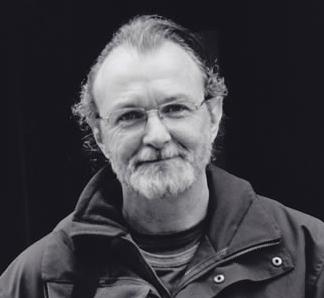Dichter
Paul Casey

Paul Casey
(Ierland, 1968)
© John Minihan
Biografie
Paul Casey was born in Cork in 1968. He grew up between Ireland, Zambia and South Africa and has worked in a number of fields, primarily film, multimedia and teaching. He has published two collections with Salmon Poetry: home more or less (2012) and Virtual Tides (2016). While mainly writing in English, he is a multilingual poet published in journals and anthologies in Ireland, the US, China, Australia, South Africa, Romania, Italy and beyond. A chapbook of his longer poems, It’s Not all Bad, was published by The Heaventree Press (2009). Since 2012 he has been poet in residence each May during the Bealtaine festival for Carechoice elderly homes around county Cork. He curates and edits the annual Unfinished Book of Poetry for Cork City Libraries, featuring verse written by transition year students from Cork city schools, and is the founder/director of the poetry organisation Ó Bhéal (www.obheal.ie).There follows the stuff of no-ordinary biography: misadventure in the South African defence forces, the vicissitudes and wanderings chronicled in ‘Painless’, a visit to the dentist where each tooth in the poet’s head recounts a mini-biography of its very own. In ‘Fly Away Paul’ the livery of Ireland’s national airline becomes, as it has for so many Irish emigrants, indeed for so many generations of emigrants, a logo of heartbreak, a brand linked inextricably with both “sunstruck wings” and the “aura of goodbye”.
Yet through all these peregrinations Casey retains a robust imaginative link to his origins, to his homeland, to a very Gaelic Ireland. As he writes “Again, again, all hearts will seek their mother”.
It is tempting, then, to view this debut as a memorable and vigorous attempt to heal some fissured link with home, to solder that original break, to find the switch that, when thrown, will send the ancestral energy pulsing through the system once again: a temptation amplified almost beyond resistance by Brian Crotty’s superb cover painting. We are inclined to view the volume as essentially circular in design, viewing the author’s poetic, personal journey as an analogue of the salmon’s twin and mighty arcs, outward then homeward.
Virtual Tides, Casey’s 2016 follow up, continues to tease out these twin themes of belonging and inheritance. ‘Stone Circle Circle’ and ‘Quiet Calf’, for instance, pick up on that earlier volume in their unabashed praise for the complexity, urbanity, and achievement of Ireland’s ancient Gaelic order; of the lost world that, as ‘These Kings of Tara’ puts it, still whispers to us from destitute and sacred grounds. While poems like ‘What the Frack’ and ‘International Citizen’ continue Casey’s unflinching reflection on Ireland’s botched contemporary republic, on the carelessness and callousness that have so indelibly disfigured that static yet turbulent polity.
Such continuities aside, however, Virtual Tides is a volume distinguished by an eagerness to change, by a willingness to push things, to further develop images that first found exposition in its predecessor, to elaborate the concepts home more or less articulated so emphatically. It’s a collection, then, that showcases a poet very much in competition with his earlier self, one operating with fresh urgency and terseness, who refuses to rest on his previous collection’s justifiably garnered laurels.
It is in the richest possible sense a more playful book. But Virtual Tides is one that conjures the pure play of children, the urgent, unprompted scenarios that pre-teens still dream up and improvise, though with ever-diminishing frequency, in our wired, device-driven world. Think of childhood imaginations conjuring rules - light and unstructured spaces - where endeavour operates under shifting, makeshift constraints, where objectives, if they exist at all, exhibit a protean fluidity.
Then open the volume’s cover (another exquisite design, on this occasion by the multi-talented Rosie O’Regan) and you can almost it hear it ringing in the distance: the bell ring that signals play-time.
For it’s such playfulness that animates a poem like ‘Jack’s Orchestra’, with its wham-bam incantation in praise of Jack Foley, father of modern sound effects, or ‘alfalfa in cursive’, luscious both in the ear and on the page. Or consider ‘Defence Forces Seek Artists’, a deft fantasia about the military’s drift toward “anti-war activity”.
In such texts, then, Casey exhibits an enviable purposelessness, a willed surrender to the casual and fortuitous, to happenstance colocations of colour and of cadence. Words are arranged and rearranged, like toy bricks stacked, toppled and built up again, purely for the almost tactile delight their recombination brings.
But another sense of ‘play’ - that conjuring performance and rehearsal - also seems operative in these pages. For poems like ‘Tides’ and ‘For Pointing at the Sun’ read not only as consummate performances in themselves but also as rehearsals for something still more honed and exhilarating.
We feel like we’re witnessing a performance being implacably sharpened, shorn of all that’s specious and extraneous. We feel, by the book’s conclusion, that we’re in the company of a poet for whom the dress rehearsal is over and the stage lights have been activated; for whom the big show, with all its terror and exhilaration, is about to finally begin.
© Billy Ramsell
It's Not all Bad, Heaventree Press, Coventry, 2009home more or less, Salmon Poetry, Co. Clare, 2012
Virtual Tides, Salmon Poetry, Co. Claire 2016
Gedichten
Gedichten van Paul Casey
Sponsors















